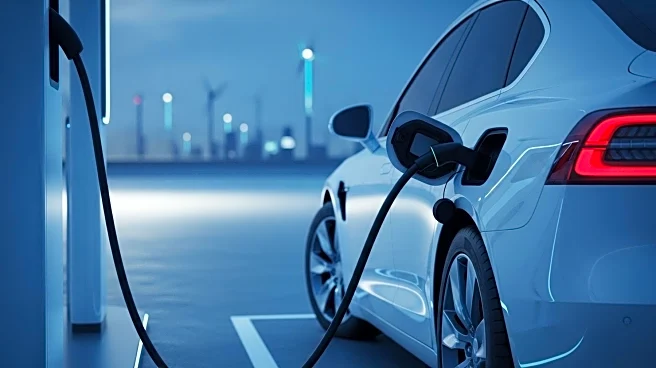What is the story about?
What's Happening?
A federal tax credit for electric vehicles, offering up to $7,500, is set to expire on September 30. This impending deadline has led to a significant increase in consumer demand for electric vehicles (EVs). According to Cars.com, nearly half of potential EV buyers are accelerating their purchases to take advantage of the tax credit. The expiration date was moved up from 2032 to 2025 as part of a tax bill signed into law in July. The demand for new EVs has increased by 33% compared to the previous year, while used EV demand has risen by 22%. The tax credit has been a major factor in making EVs more affordable, with 70% of EV shoppers aware of the credit and over half knowing its expiration date. Analysts predict a sharp decline in EV sales once the credit expires, with expectations that EVs' market share could drop significantly by the end of the year.
Why It's Important?
The expiration of the federal EV tax credit is likely to have a substantial impact on the electric vehicle market in the United States. The credit has been a crucial incentive for consumers, making EVs more financially accessible. Its removal could lead to a decrease in EV sales, affecting manufacturers and dealers who have benefited from the increased demand. Automakers like Ford are already planning to introduce lower-cost EV models to maintain market interest. However, the potential drop in sales could slow the transition to electric vehicles, impacting efforts to reduce carbon emissions and meet environmental goals. The situation highlights the importance of government incentives in driving consumer behavior and supporting emerging industries.
What's Next?
As the deadline approaches, consumers are expected to continue rushing to purchase EVs to benefit from the tax credit. After the expiration, the market may experience a slowdown, with fewer buyers willing to pay the higher prices without the incentive. Automakers and dealers will need to adjust their strategies, possibly by offering new promotions or focusing on state and local incentives that remain available. The industry will be closely watching consumer reactions and sales trends in the coming months to gauge the long-term impact of the credit's expiration.

















